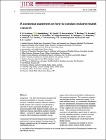| dc.contributor.author | Garcia Iriarte, Edurne | |
| dc.date.accessioned | 2019-10-16T13:31:59Z | |
| dc.date.available | 2019-10-16T13:31:59Z | |
| dc.date.issued | 2019 | |
| dc.date.submitted | 2019 | en |
| dc.identifier.citation | Frankena, T. K., Naaldenberg, J., Cardol, M., Garcia Iriarte, E., Buchner, T., Brooker, K., Embregts, P., Joosa, E., Crowther, F., Fudge Schormans, A., Schippers, A., Walmsley, J., O'Brien, P., Linehan, C., Northway, R., van Schrojenstein Lantman-de Valk, H., Leusink, G. A consensus statement on how to conduct inclusive health research, Journal of Intellectual Disability Research, 2019, 63, 1, 1-11 | en |
| dc.identifier.other | Y | |
| dc.identifier.uri | https://onlinelibrary.wiley.com/doi/full/10.1111/jir.12486 | |
| dc.identifier.uri | http://hdl.handle.net/2262/89761 | |
| dc.description.abstract | Background: The active involvement of people with intellectual disabilities in research, or inclusive research, is relatively common. However, inclusive health research is less common, even though it is expected to lead to appropriate healthcare and increased quality of life. Inclusive health research can build upon lessons learned from inclusive research.
Method: A total of 17 experts on inclusive (health) research without intellectual disabilities and 40 experts with intellectual disabilities collaborated in this consensus statement. The consensus statement was developed in three consecutive rounds: (1) an initial feedback round; (2) a roundtable discussion at the 2016 International Association for the Scientific Study of Intellectual and Developmental Disabilities World Congress; and (3) a final feedback round.
Results: This consensus statement provides researchers with guidelines, agreed upon by experts in the field, regarding attributes, potential outcomes, reporting and publishing, and future research directions, for designing and conducting inclusive health research.
Conclusions: Consensus was reached on how to design and conduct inclusive health research. However, this statement should be continuously adapted to incorporate recent knowledge. The focus of this consensus statement is largely on inclusive health research, but the principles can also be applied to other areas. | en |
| dc.language.iso | en | en |
| dc.publisher | Wiley | en |
| dc.relation.ispartofseries | Journal of Intellectual Disability Research; | |
| dc.relation.ispartofseries | 63; | |
| dc.relation.ispartofseries | 1; | |
| dc.rights | Y | en |
| dc.subject | Health research | en |
| dc.subject | Inclusive research | en |
| dc.subject | Intellectual disabilities | en |
| dc.subject | Participation | en |
| dc.subject | User involvement | en |
| dc.title | A consensus statement on how to conduct inclusive health research | en |
| dc.type | Journal Article | en |
| dc.type.supercollection | scholarly_publications | en |
| dc.type.supercollection | refereed_publications | en |
| dc.identifier.peoplefinderurl | http://people.tcd.ie/iriartee | |
| dc.identifier.rssinternalid | 199843 | |
| dc.identifier.doi | http://dx.doi.org/10.1111/jir.12486 | |
| dc.rights.ecaccessrights | openAccess | |
| dc.subject.TCDTheme | Inclusive Society | en |
| dc.subject.TCDTag | INTELLECTUAL DISABILITY | en |
| dc.subject.TCDTag | Inclusive research | en |
| dc.identifier.rssuri | 10.1111/jir.12486 | |
| dc.identifier.orcid_id | 0000-0002-8155-1263 | |
| dc.status.accessible | N | en |




